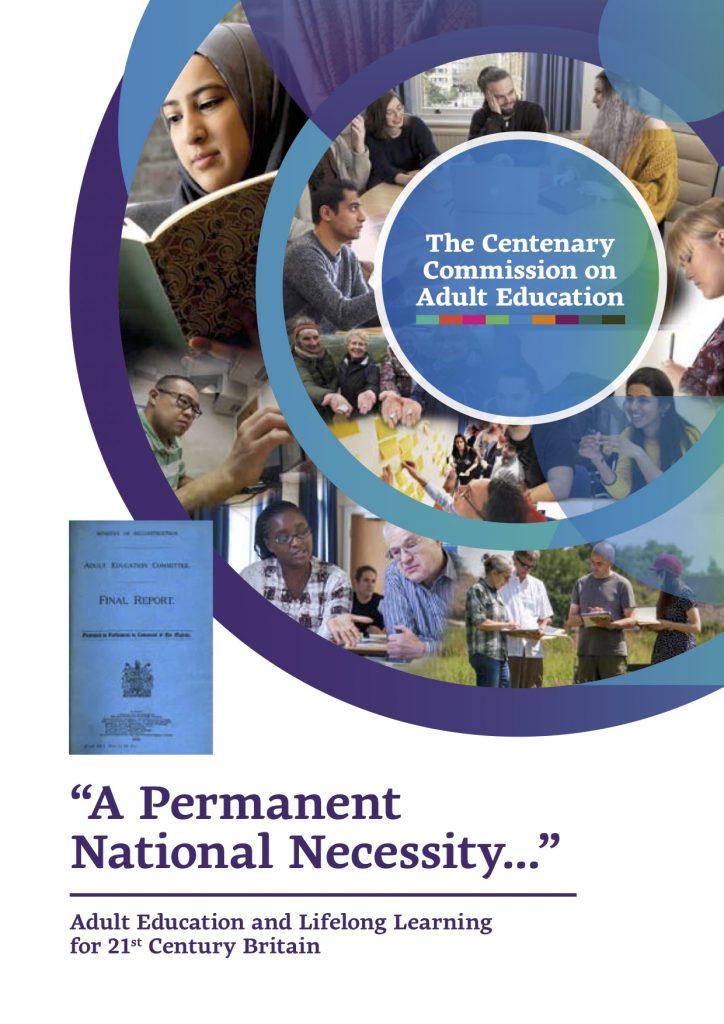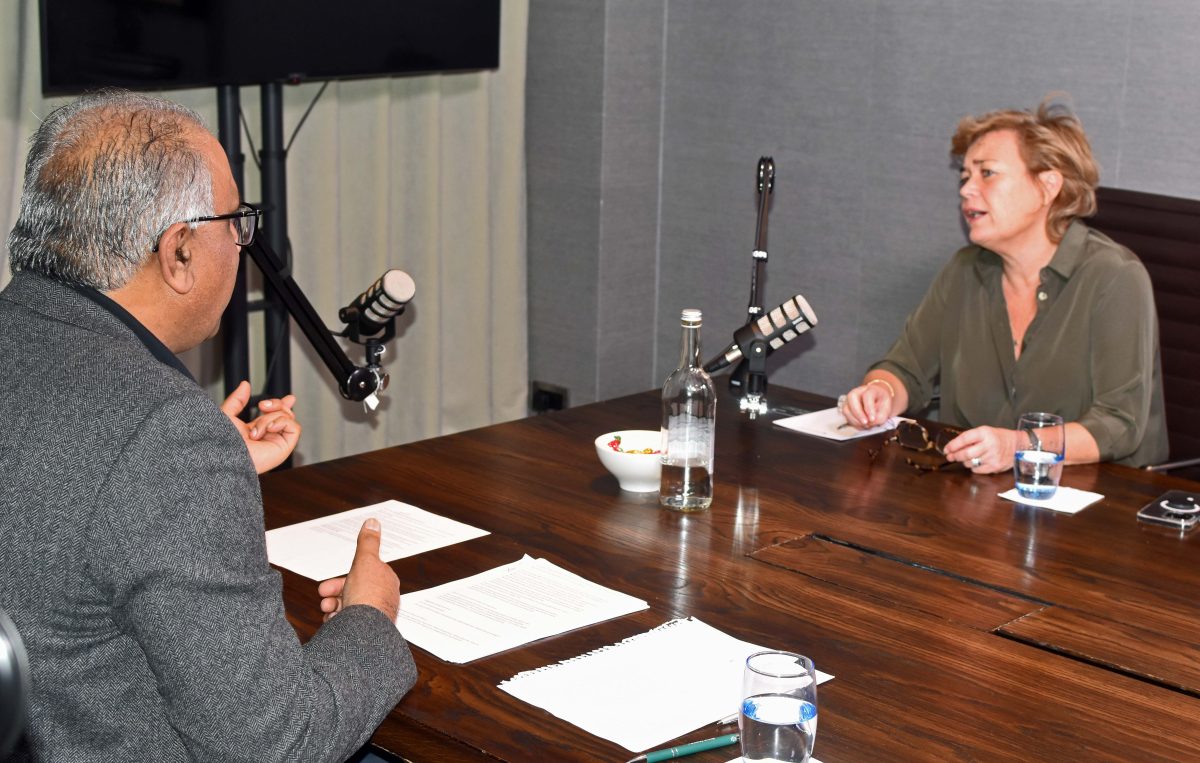The Centenary Commission on Adult Education publishes final report #AdultEducation100

National strategy needed for adult education and lifelong learning, new report argues
The centenary of the Ministry of Reconstruction’s Final Report on Adult Education was published today (18 Nov) to coincide with the November publication of the 1919 report. The Report is entitled: “A Permanent National Necessity…” Adult Education and Lifelong Learning for 21st Century Britain.
The Adult Education 100 campaign was launched earlier this year to create a wide-ranging debate on adult education today and in the future.follows the launch of the 1919 Commission to mark the centenary of the Ministry of Reconstruction’s Final Report on Adult Education – a significant milestone in the history of adult education in the UK.
In 1919, the Ministry of Reconstruction’s adult education committee published a Report on Adult Education, arguing that a population educated throughout life was vital for the future of the country. This report set the groundwork for a liberal approach to adult education for the rest of the 20th century. Its centenary is a vital opportunity to reflect on the needs and possibilities for adult education today and into the century ahead.
“Adult education must not be regarded as a luxury for a few exceptional persons here and there… it is a permanent national necessity, an inseparable aspect of citizenship, and therefore should be both universal and lifelong.” – taken from the 1919 Report
The Centenary Commission – which includes WEA CEO Ruth Spellman, has published its findings 100 years since the publication of the landmark 1919 Report on Adult Education by the Ministry of Reconstruction’s adult education committee.
This Report, like its predecessor comes at a critical time, following a dramatic decline in participation in adult education, with funding for adult learning and apprenticeships having fallen by 45 per cent in real terms since 2009-10, we face a series of social, political, economic, technological and demographic challenges.
The Centenary Commission report is calling for:
- A national Adult Education & Lifelong Learning Strategy, with a participation target to reduce the gap between the most and least educationally active.
- A Minister with specific responsibility for Adult Education and Lifelong Learning to report annually to Parliament on progress.
- Community Learning Accounts, alongside Individual Learning Accounts to provide funding for informal, community-based learning initiatives led by local groups.
The challenge The 1919 Report identified the contemporary challenges in a way that resonates today:
- In the midst of war, people sought peace and international cooperation to secure it. Today, the most pressing global issue is climate crisis – which requires citizens to understand how they, wider society and their elected leaders can act effectively to combat and deal with this threat.
- In 1919, the Commission were concerned about the demands of women for equality in the workplace and society. While gender equality is still a persistent issue, the challenge of social and economic inequality in the UK in 2019 extends far beyond gender, into race, disability, sexuality and social origin.
- The belief in the 1919 Report that adult education can heal fractured communities and foster a healthy democracy is a powerful message. The analysis of the 2016 Referendum vote suggests that communities are more divided than in living memory, many feeling ‘left behind’ by – or excluded altogether from – today’s politics and public debates. As people grow tired of the failure of representative politics to achieve change, adult education can help them find confidence and a voice to participate in local, regional and national debate and action
- Artificial Intelligence is now threatening the number and quality of jobs – as ‘the tyranny of machinery’ was doing then. Most jobs will be affected in some way by current economic and technological developments – estimates of occupations that will disappear entirely range between 9% and 44%. If people are to adapt, they will need flexible and generic capabilities.
A hundred years ago, as Britain recovered from a devastating World War, the Ministry of Reconstruction published an extraordinarily powerful report, visionary in its scope and practical in its detail, on the key role adult education had to play in fostering an active democracy, enriching communities, and nourishing curiosity and a love of learning.
Adult education was it argued, ‘a permanent national necessity’. The authors of the 1919 Report were drawn from a spectrum of those with an interest in rejuvenating the economy and society after the devastation of world war, along with those with experience in delivering adult education.
Jo Cain, Deputy CEO of the WEA, said:
“We are operating in difficult times, socially and politically and the Centenary Commission’s report offers a vision for adult education that meets the needs of communities and individuals across the country to overcome the challenges we currently face. We hope that this new report is recognised by government in the same way as the 1919 report which gave government, national and local, a direct responsibility for ensuring the adequate supply of adult education to tackle the massive social, economic and political challenges of the time. Especially given that today the numbers of adults learners and the funding they receive are at an all-time low, despite the enormous impact of adult education on our society.”
Jo added: “We are delighted that the WEA were involved in the Centenary Commission through our CEO Ruth Spellman as our founder Albert Mansbridge played a key role in the Ministry of Reconstruction’s Adult Education Committee back in 1919.”
Dame Helen Ghosh, Master of Balliol College, Oxford, and Chair of the Commission, said:
“There is a national consensus in favour of adult education and lifelong learning. We need the next government to step up to the challenge, and deliver what is, in the words of the 1919 report and today’s report, ‘a permanent national necessity’. In meetings across the country our Commission found a huge appetite for adult education and lifelong learning – we saw evidence of communities being brought together through imaginative educational initiatives; new groups being formed to analyse and discuss the issues of the day, including the climate crisis; and a desire to understand and prepare for the changing world of work, including amongst those in the ‘gig economy’ for whom provision at present is scant. Our Commission’s recommendations would address all these needs.”
The Centenary Commission’s report aims to be equally visionary in scope and practical in its detail, in order to stimulate a national debate, and new thinking about adult educational policy.

 Executive Job Advertising Bundle
Executive Job Advertising Bundle 










Responses